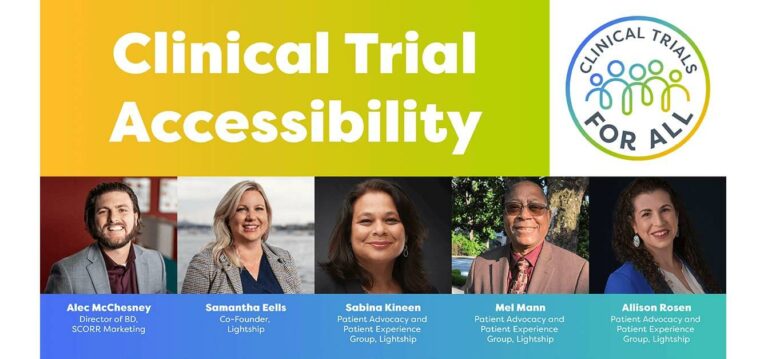LGBTQIA+ Research Participation: Why It Matters and How You Can Help
Have you ever wondered how new medicines and treatments are developed? The answer is clinical trials. These studies test how well new medical approaches work, and they are an important step in bringing new treatments to people who need them.
For these trials to work best, research participation needs to include all kinds of people: from different racial or ethnic backgrounds, across different regions, and different sexual orientations and gender identities. That’s where you come in. If you’re part of the LGBTQIA+ community, your participation in clinical trials is more important than you might realize. Your experience and your health matter. By participating in clinical trials, you can help shape the future of health care for yourself and your community, now and for generations to come.
Why LGBTQIA+ Trial Participation Matters
Historically, LGBTQIA+ individuals have often been left out of medical research. This means that fewer LGBTQIA+ people have been involved in studies compared to the percentage of people who are part of the community overall.
This lack of representation has a real impact. LGBTQIA+ people often face unique health challenges. For example, studies show higher rates of certain cancers and mental health conditions in some LGBTQIA+ groups. By participating in clinical trials, you can help researchers better understand these differences and develop treatments that work for everyone.
There are also some health concerns that are specific to LGBTQIA+ individuals. For instance, transgender people may have unique needs related to hormone therapy or gender-affirming surgeries. When LGBTQIA+ people are included in research, it helps health care providers offer more informed, compassionate care to all patients, including those with diverse sexual orientations or gender identities.
Challenges and Solutions in LGBTQIA+ Clinical Research Participation
LGBTQIA+ individuals may face some unique challenges when it comes to clinical trials. But for each challenge, researchers, organizations, and communities are working on solutions, as reported by Citeline:
- Lack of targeted outreach: Many clinical trials don’t specifically reach out to LGBTQIA+ communities
- Solution: Various organizations and groups are partnering with researchers to ensure trials are advertised in LGBTQIA+ spaces and media
- Fear of discrimination: Some LGBTQIA+ individuals have faced discrimination in health care settings
- Solution: Many research centers now offer LGBTQIA+ cultural competency training for their staff and design trials to be more inclusive
- Privacy concerns: Some may worry about disclosing their sexual orientation or gender identity
- Solution: Researchers are developing more sensitive ways to collect this information, including options to decline to answer and ensuring data protection
- Inclusive language and practices: Not all trials use inclusive language that makes LGBTQIA+ participants feel welcome; for example, a trial form that only includes male or female is not inclusive of nonbinary or intersex participants
- Solution: Guidelines are being developed for researchers on using inclusive language in all aspects of clinical trials
- Logistical barriers: It might be challenging to find LGBTQIA+-inclusive research centers nearby
- Solution: More trials are offering remote participation options or travel support for participants
- Minimal regulation: Regulatory agencies have failed to address the lack of LGBTQIA+ representation in clinical trials
- Solution: While the U.S. Food and Drug Administration (FDA) guidance on diversity action plans for clinical trials does not mandate the collection of sexual orientation and gender identity (SOGI) data, the National Institutes of Health (NIH) has a five-year Strategic Plan to Advance Research on the Health and Well-being of Sexual & Gender Minorities.
- Solution: While the U.S. Food and Drug Administration (FDA) guidance on diversity action plans for clinical trials does not mandate the collection of sexual orientation and gender identity (SOGI) data, the National Institutes of Health (NIH) has a five-year Strategic Plan to Advance Research on the Health and Well-being of Sexual & Gender Minorities.
By getting involved in clinical trials, you can also be part of the solution! Your participation helps researchers learn how to make trials more inclusive and accessible. It also sends a message that LGBTQIA+ health deserves attention.
Benefits of Participating in Clinical Trials

We’ve talked about why your participation matters for the LGBTQIA+ community as a whole, but there are also many potential benefits for you as a participant:
- Clinical trials often provide access to new treatments before they’re widely available. This could be helpful if you’re living with a condition that doesn’t have many effective treatment options. The medical care in trials can also help you better understand and manage your health.
- Some clinical trials offer compensation for your time and travel expenses; this depends on the specific trial.
- While this isn’t a direct personal benefit, many participants also find it rewarding to know they’re helping advance medical science and potentially improving lives.
- To see the impact that clinical trials have on treatments for patients, search Trialsummaries.com for easily understandable synopses of trial results.
Every clinical trial is different, and the benefits can vary. It’s important to discuss the potential benefits and risks with the research team.
How to Get Involved in Clinical Trials
Ready to take part in a trial? Here are some ways to get started:
- Talk to your health care provider: They might know of trials relevant to your health situation or can refer you to researchers in your area. Outcare provides a searchable database of LGBTQIA+-affirming health care providers. If you represent a health care organization and want to identify as an LGBTQIA+ ally, start here.
- Use online resources: Websites like ClinicalTrials.gov allow you to search for trials based on your location, condition, and other factors. Some LGBTQIA+ health organizations also have lists of LGBTQIA+-inclusive trials. Fenway Health — which provides health care, research, education, and advocacy for the LGBTQIA+ and other underserved communities — has many ongoing studies through The Fenway Institute.
- Contact LGBTQIA+ health centers: If there’s an LGBTQIA+-focused health center in your area, the staff might be aware of relevant trials or be conducting research themselves.
- Check with local universities: Many clinical trials are conducted at university medical centers. Check their websites or contact their research departments. In fact, Stanford is currently recruiting for The PRIDE Study, the first large-scale, long-term national health study of its kind.
- Join research registries: Some organizations maintain registries of people interested in participating in research. By joining, you’ll be notified when relevant studies become available.
Remember, you always have the power to choose which studies you want to be part of and to ask for what you need during the process.
You Can Make a Difference
LGBTQIA+ participation in clinical trials is crucial for advancing health care that truly serves everyone. While there may be challenges in participating, there are also organizations and researchers working hard to make clinical trials more accessible and inclusive. By getting involved, you can become part of this positive change.
Whether you decide to participate in a clinical trial, share this information with others, or simply learn more about LGBTQIA+ health research, you’re taking an important step. Every action, no matter how small, contributes to a future where health care truly serves all of us.






